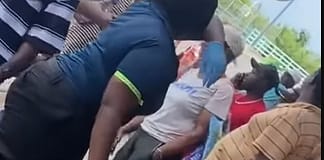The Director of the Financial Intelligence Unit (FIU), Matthew Langevine, says students, housewives and unemployed people are being used by criminals and drug dealers to launder funds on their behalf.
Langevine said the FIU has been receiving increasing numbers of suspicious transaction reports, from money transfer agencies.

He said that It has also been discovered that individuals involved in offences tied to drug and human trafficking and money laundering are utilising the services of the students and unemployed people.
“We have seen students being used to send monies through these money transfers agencies, housewives, unemployed persons etc. We want to encourage the public at large to be vigilant against these activities and not to get caught up in these activities,” Langevine said.
The FIU said that last year, it received 330 suspicious transaction reports, the majority of which came from money transfer agencies and so far this year, 120 suspicious reports have been made to the unit.
““[It is] a sector which we see a high level of suspicious transaction activities where monies are sent cross borders that raise a number of concerns,” Langevine said, adding that every citizen has an obligation to play his or her part in fighting money laundering.
“We want to encourage the public at large, not to get caught up in those kinds of activities however beneficial it may seem to you in the onset because it can have far-reaching implications for persons.”
The FIU head said he was thankful to the more than 330 reporting agencies that continue to provide the much-needed information to the unit.
“We have been getting relatively good support. I think the entities recognise the importance of this and with the kind of engagements we have been having nationally to ensure that the agencies understand their obligation, they appreciate why they need to be reporting the information to us.”
He said these engagements include outreaches and training across the country.
The FIU said that at least 12 reports have been sent to the Special Organised Crime Unit (SOCU) and that it has also been receiving suspicious transaction reports from a number of financial institutions, the Guyana Gold Board (GGB) and gold dealers.
In its 2019 International Narcotics Control Strategy Report on Money laundering, the United States noted that Guyana’s National Risk Assessment 2017 found that it has a medium-to-high money laundering risk. “Unregulated currency exchange houses and dealers in precious metals and stones pose a risk to Guyana’s AML/CFT system. Other sectoral vulnerabilities include the banking industry and unregulated attorneys, real estate agents, used car dealers, and charities,” Washington said.
It said while the country has made “significant progress” on the anti-money laundering (AML) front, more investigations and successful prosecutions are needed.
“Historically, the primary sources of laundered funds are narcotics trafficking and real estate fraud. However, other illicit activities, including human trafficking, gold smuggling, contraband, and tax evasion, are also sources. The licensing policies and procedures of Guyana’s unsophisticated banking and financial institutions increase the risk of drug money laundering,” the Us State Department added.
It said common money laundering typologies include large cash deposits using fake agreements of sale for non-existing precious minerals, cross-border transport of concealed precious metals to avoid payment of the relevant taxes and duties, and wire transfer fraud using compromised email accounts.
Advertise with the mоѕt vіѕіtеd nеwѕ ѕіtе іn Antigua!
We offer fully customizable and flexible digital marketing packages.
Contact us at [email protected]
















